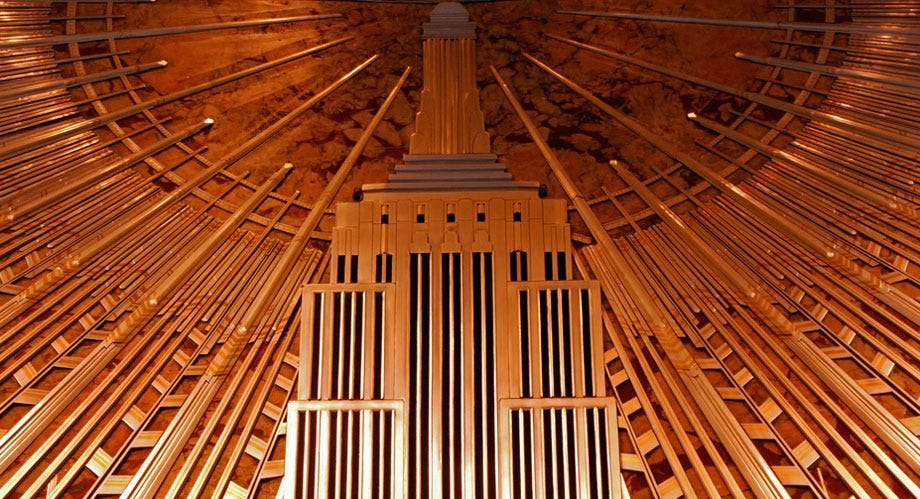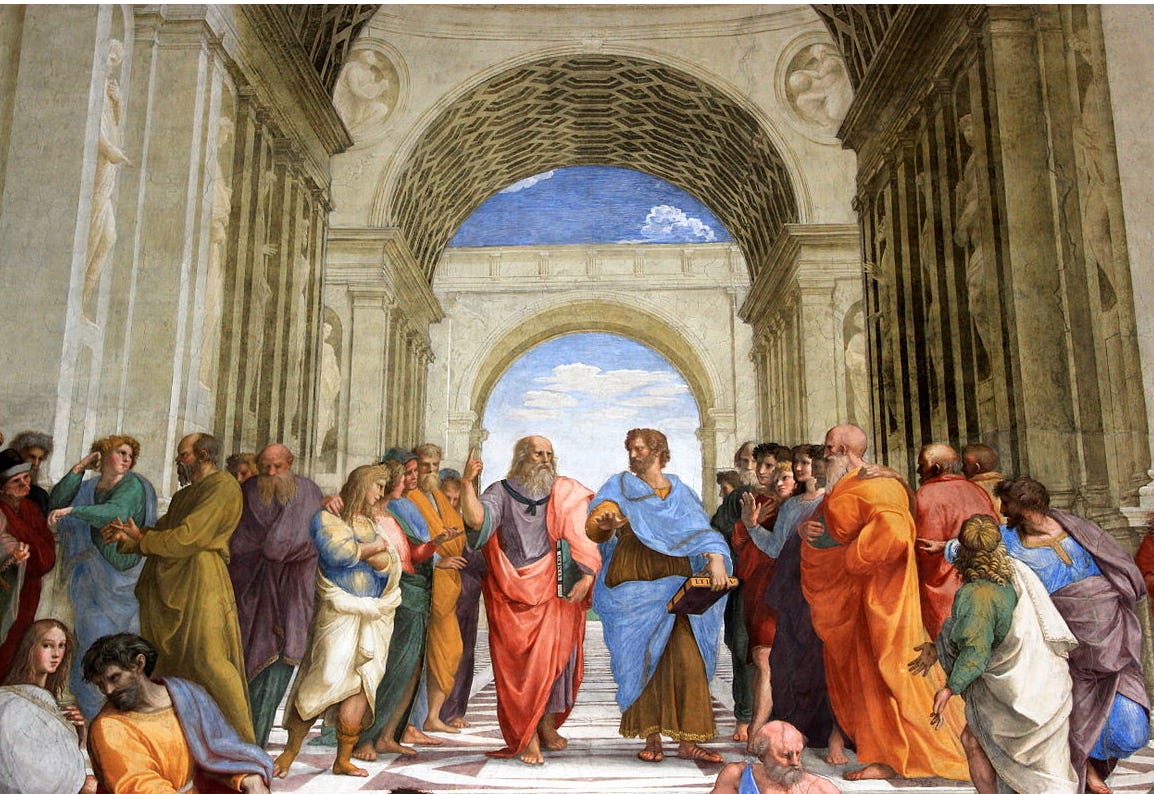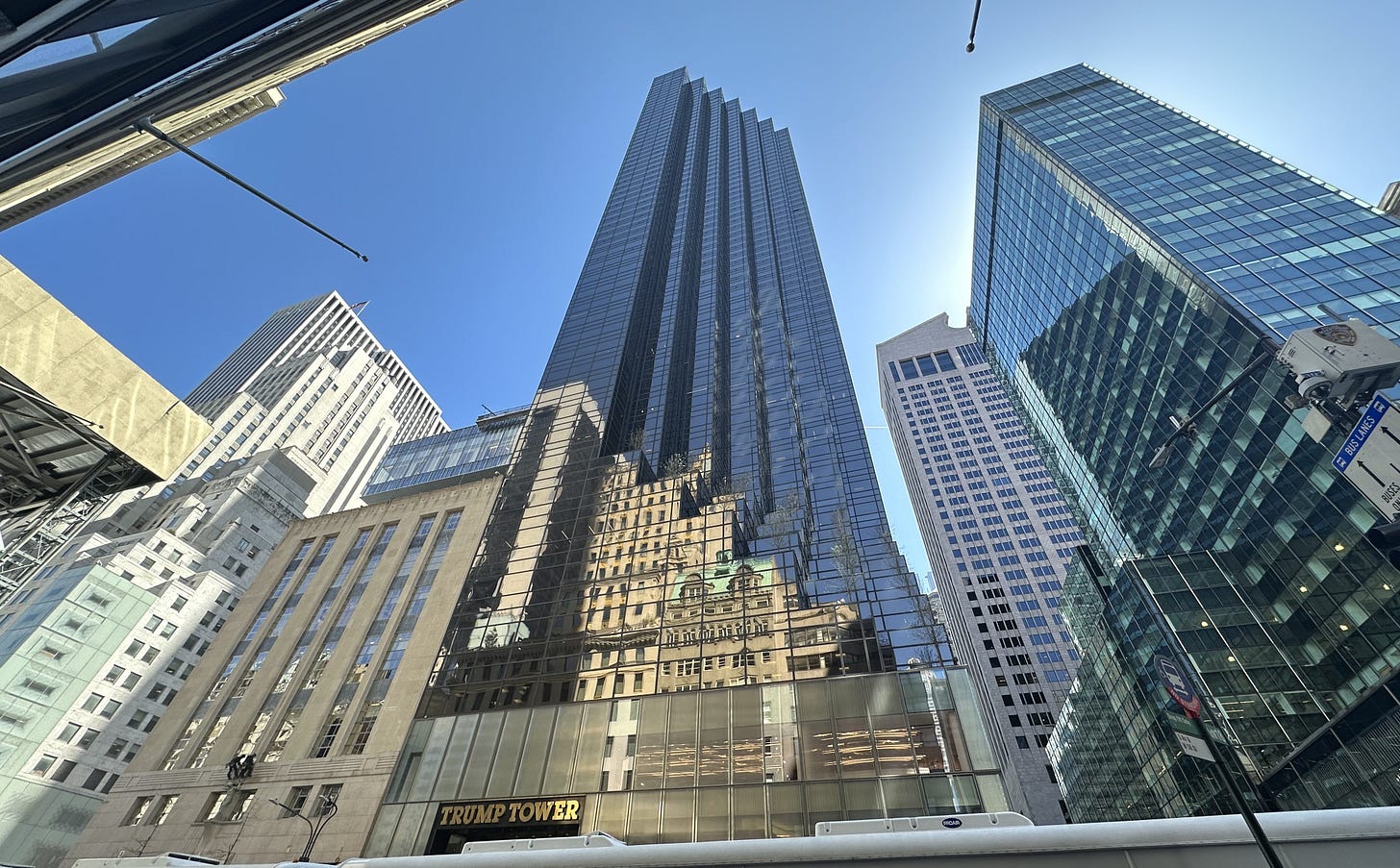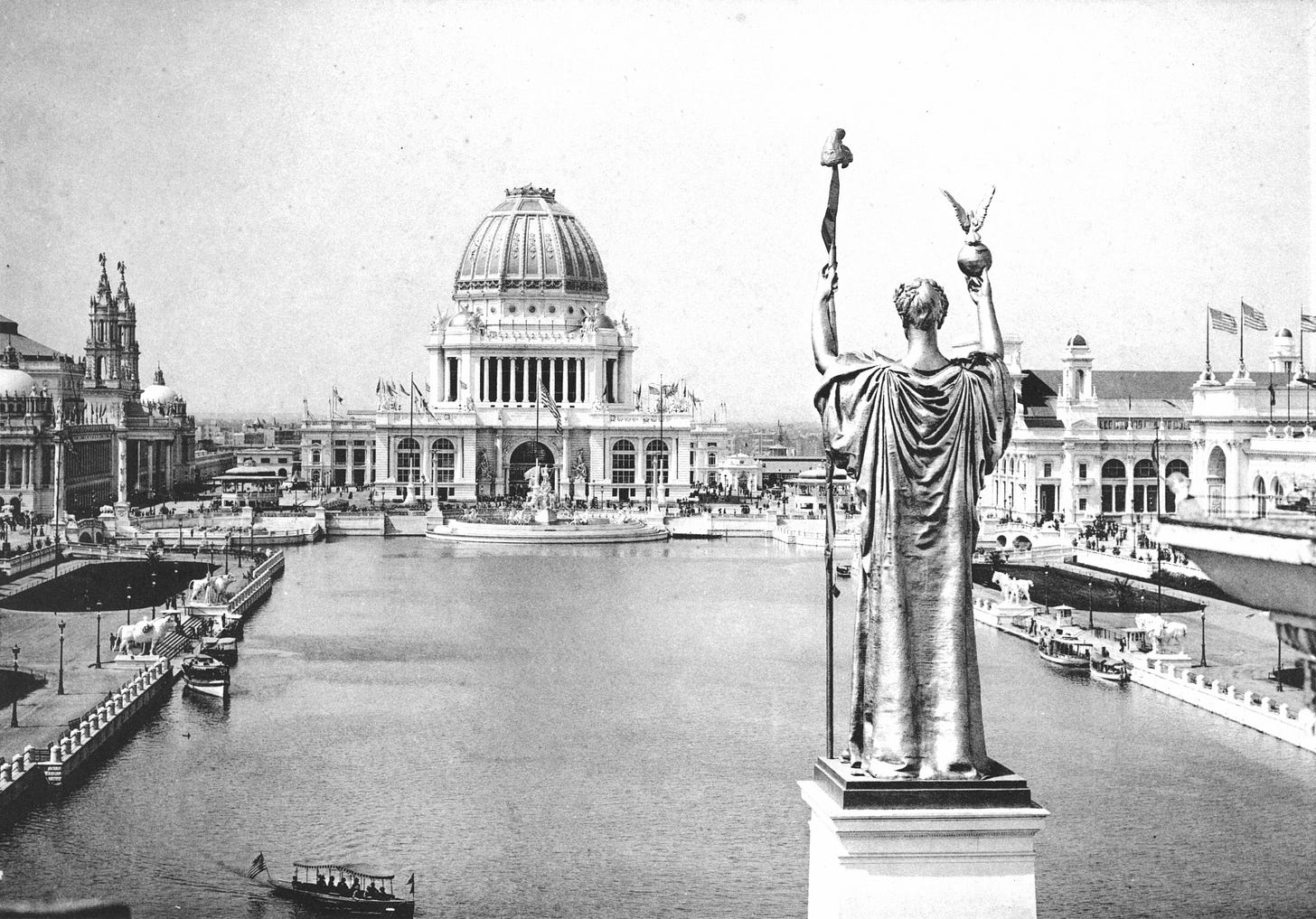Trump’s Freedom Cities and American Greatness
A Positive Vision For American Ingenuity In An Age Of Stagnation
Perhaps the greatest plague affecting America right now is a crisis of stagnation, which pervades nearly every aspect of modern life: as seen in the diverse arenas of politics and technology to economics and culture to the general malaise of the country at large. While each of these categories may appear unrelated, the stagnation which unifies them springs from a common source. Their complex origins might only be described in general terms at best: bureaucratic largesse; systemic failures inherent in “mass” or “modern” democracy; a dispirited population, spiritually castrated by drugs, poisoned food, insidious propaganda, and technological overstimulation. A large part of this may be irreversible, following the natural cycle of a civilization once it transforms into an empire and then becomes decadent, at which point basic systems become dysfunctional, and the entire apparatus – mired by legalistic and bureaucratic overcomplexity – implodes by dint of its own handiwork.
However, even having embarked upon a trajectory of seeming insurmountable decline – to the extent ours follows the same pattern as other past great civilizations that similarly found themselves staring down oblivion – always there can be found the seeds, however small, of renewal. While it may be easy to overlook such seeds, particularly given the widespread distractions, hostility to low time preference thinking, and general incuriousness that characterizes the public mind today, those especially perceptive citizens, who can discipline themselves just enough to cancel the noise, will be rewarded for piecing together how an optimistic future – committed to innovation – might come out of the decay.
First, the signs pointing towards an alternative to the present, seemingly unconquerable stagnation, may be inferred through the erosion of legitimacy of nearly every major public and private institution of significance: from government, to mainstream media, to major financial institutions, to organized religion, to the entertainment industry, to professional sports, to individual politicians, celebrities, and business leaders. If the legitimacy – meaning credibility – of every pillar of modern society is being rapidly eroded by the day, the basic building blocks of civilization will inevitably collapse – or at least be transformed (for what alternative exists?). This is indicative of a social contract in terminal disarray. Without the social contract that binds and creates a people, society will necessarily implode.
In our politics, disagreement over first-order principles abound: whether men and women are different; whether countries should have borders; whether the Constitution, the binding and operative law of the land, is a credible and true authority (and particularly among the lawyers purportedly tasked with defending its precepts). Each of these first-order problems should be clear evidence that the illness now affecting our political system is indeed malignant, which can no longer endure under the old rules and thus must undergo a radical transformation or face certain death. In addition to the political polarization which mires our present system root and branch, and which nobody has yet found a viable solution to, fundamental changes now occurring to our monetary systems, paired with a concerted rush towards decentralization broadly, would seem to further hint to a way out of the present madness. Finally, the comparative strength of state governorships and local politics generally speaking, which are only increasing in power, in contradistinction to what is now possible in Washington with all the bureaucratic stagnation, should be further evidence of a reversion to a kind of federalism, localism, or even tribalism, as a potential antidote to the virtual eradication of freedom at the federal level.
Though it is worth noting that the above is not to overlook the consolidation of federal power by bureaucratic, administrative, and deep state agents, that have effectively usurped the Congress’ constitutional mandate by taking the latter’s rulemaking duties in their own hands, denying the democratic component – the will of the people – in the process. Nor is it to overlook the great perils that come with a society increasingly connected by the forces of a common technology, which threatens to level regional distinctions entirely and homogenize the public into a collective hivemind, with the existential risk of AI on the horizon – cleaving to the lowest common denominator of public discourse – that can theoretically instantiate and make permanent bureaucratic tyranny at the national level, and do so rather seamlessly.
This is to say that even to the extent that federal power technically or formally increases relative to state power, the natural laws of bureaucratic largesse and inefficiency that invariably plague any organization or system that grows too large should open many doors for thwarting federal power with more efficient, state and local alternatives. The latter scenario in some ways represents the greatest achievement of Ron DeSantis’ governorship in the face of an increasingly tyrannical and illegitimate Biden regime. At the same time, it further underscores the tragedy of the DeSantis administration, which is now apparently concerned with pursuing a federal presidential campaign – rather than explore in his capacity as governor just how far an innovative policymaker might be able to push the boundaries of Washington’s comparative incompetence to pursue programs that may have otherwise been unthinkable, at both a federal and state level, due to legalistic and other problems, just a short while ago. In short, there currently exists a large chasm between what is possible for Governor DeSantis as a state officeholder – and for that matter, any red state governor – and what he has accomplished on a policy front that is waiting to be exploited.
* * * *
The city, in its ancient version, is the highest form of political life. It represents a development beyond tribalistic societies, where survival is the key aim of politics, and creates a unifying front whereby the higher human goods, including the arts and sciences, can reach their natural potential.
And so, we return to the topic at hand: the opportunity that lies at the heart of Trump’s Freedom Cities. This policy proposal could potentially amount to Trump’s most ambitious program yet, and if realized has the makings to be the defining hallmark of his legacy. Indeed, no greater policy based explicitly on American Greatness than Trump’s Freedom Cities initiative has been entertained by any prospective candidate, which provides a template by which true democracy – not the astroturfed counterfeit regularly paraded by propagandistic organs of the deep state that must resort to shameless gaslighting, digital manipulation, and election rigging to overcome the will of the people – might again flourish. Furthermore, the proposal captures Trump’s entrepreneurial and creative spirit in a way quite unlike any other policy and returns to his true roots as builder and innovator, which have tragically been sidelined now for nearly a decade by the petty legalistic bloodletting of a system that anathematizes ingenuity wholesale.
The idea of a Freedom City, at least at its highest level of generality as a citadel where freedom and innovation could thrive, strikes a positively classical chord. It is reminiscent of Greek city states like Athens and Sparta that became vehicles for varying expressions of democratic experimentation. The city, in its ancient version, is the highest form of political life. It represents a development beyond tribalistic societies, where survival is the key aim of politics, and creates a unifying front whereby the higher human goods, including the arts and sciences, can reach their natural potential. The ancient city is the place where human societies become fully civilized, and man could thereby realize his proper end. No other political society offers what man can achieve in the ancient city, and it is the reason why the greatest models of human excellence – Socrates, Plato, Aristotle – to this day remain inextricably linked to this one political form.
In sharp contrast, the modern city is at best an extremely vulgar counterfeit of its classical alternative. To the extent it resembles the classical version at all, it may only be in name. This in large part goes to the semantic shift that has fundamentally transformed the underlying referent by which the term “city” is understood. In classical times, the city was the small republic – it was the regime of the society of the whole, hence the name of Plato’s most famous dialogue that fleshed out its meaning to its fullest possible extent. Today, the city is a component of a much larger political tapestry – it is an incubator of the values of the mass democratic regime. Modern cities like New York, Los Angeles, and Washington, D.C., being incubators of regime ideology, are also where the excesses of such ideology are most readily on display for the rest of the population. The modern city, therefore, stands as a political harbinger for what ultimately will happen – both good and bad – to the rest of the society.
Based on the above description, the prognosis of the modern city appears quite bleak. The day-to-day realities now characteristic of virtually every major city across the Western world only add credibility to this bleak prognosis: high crime rates, unmanageable rates of homelessness, systemic government inefficiencies that make once basic tasks, such as cleaning the streets of garbage and human waste, now seem like monumental hurdles. While the city (at least in its present iteration) may be doomed in the West, the modern city is not always and everywhere a failed phenomenon. The non-Western world provides several examples of high- functioning modern cities, emblematic of the way cities used to look and operate in Western countries. Two standout cases are Dubai and Singapore, cities that should otherwise be celebrated for their innovation and development, providing models for which Western leaders might aspire to. Regrettably, the destruction of the modern city is as much by intentional design as it is due to administrative incompetence. And so, the seeds of destruction, which institutionalizes corruption while stripping its citizens of the basic protections needed for survival, are baked into the calculus.
The non-Western world provides several examples of high- functioning modern cities, emblematic of the way cities used to look and operate in Western countries. Two exceptional cases are Dubai and Singapore, cities that should otherwise be celebrated for their innovation and development, providing models for which Western leaders might aspire to.
The proposal by Trump, however, would seem to draw from the best of America’s former spirit of competitive ingenuity, and thus would likely invoke those model cases aforementioned. For that reason, the Freedom Cities stand fundamentally at odds with the current philosophy of managed decline that typifies cities throughout the Western world. One can only begin to imagine the possibilities for a city spared of the stultifying bureaucratic and regulatory largesse that now makes building another Trump Tower, let alone another Manhattan, impossible. If the spirit of American innovation were allowed to operate unencumbered in the sorts of regulatory-free citadels envisioned by Trump’s program, the possibilities of what might develop are limited only by the powers of man’s imagination.
One can only begin to imagine the possibilities for a city spared of the stultifying bureaucratic and regulatory largesse that now makes building another Trump Tower, let alone another Manhattan, impossible.
These cities might be able to combine the fruits of modern technology with the rich architectural traditions of the ancient world. Picture a train station resembling the original Pennsylvania Station’s neoclassical style, before it was torn down in the 1960s, but with highspeed rail. Picture libraries modeled on ancient Greek and Roman architecture, or airports resembling medieval cathedrals instead of the soul-crushing, brutalist monstrosities that line so many urban streets today. These cities might also mix-and-match their themes, incorporating the best styles of every civilization. If we truly are at the end of history, instead of allowing the past to crush us, we should instead be drawing from its prolific reservoir, incorporating the very best of what every civilization produced, given that all of recorded history’s achievements are now readily at our fingertips, perfecting their methods with the help of modern technology. That truly would be the hallmark of a civilization confident in its aims and proud of its heritage. For example, New York, a city intimately familiar to Donald Trump, would have fully realized its Art Deco tradition, continuing to build upon those crowning achievements in the Chrysler Building, Empire State Building, and Radio City Music Hall – rather than kick that heritage to the wayside for the lifeless, one-dimensional skyscrapers now being erected. These modern pillars look obnoxiously foreign and out of place and threaten to fundamentally sabotage the city’s timeless skyline into something unrecognizable. Freedom Cities, by stark contrast, would venerate our sacred traditions, exalting – rather than condemning – the human spirit, as well as the divine source of that innovation – which not only would be conducive to the flourishing of the arts, but of every great endeavor of the human mind.
Trump’s proposal draws from the best of America’s former spirit of competitive ingenuity.
There is no fundamental law in nature that says we must resign ourselves to forever decline. Although we live in an age of tyrannical homogenization, what compels us to conform to the regnant status quo is not something that comes to us from above on a stone tablet but is simply a matter of human convention – in other words, choice. Human beings have free will and free agency: the choice to conform, maybe the preference of most, should not prevent the few who would rather wish to opt out of the present system – and pursue an alternative approach to channel their creative energies. That should not be forgotten. There is no reason why Donald Trump or Elon Musk should be the only two men capable of pursuing their entrepreneurial and creative visions. Other men, perhaps even greater men, might arise in their wake – furthering the innovations they started, or discover something entirely new. If the Freedom City is what would allow such men to pursue these talents and bequeath upon the rest of us the fruits of their gifts, society as a whole would benefit.
In an ideal world, the Freedom City would aspire to replicate the power of the ancient city, which remains all these centuries later the ultimate expression of human greatness. Thus, the Freedom City’s ultimate objective would be the recovery of a kind of education that was only best realized in the ancient world: namely, the education in the virtues, the tradition of Plato and Aristotle. It is only from that cultural wellspring, whether directly or indirectly, that other great civilizations spawned – whether the poetry of Dante or the philosophy of Aquinas harkening to Aristotle and Plato – or the recovery of Cicero that ignited the Renaissance which inspired the works of Da Vinci and Michelangelo, and which, in later centuries, served as an inspiration for our own Revolution. In pursuit of this aim, Freedom Cities should orient around a common cultural touchstone – at the bare minimum, maybe a common language, or perhaps even a unifying religion or ethnicity. Even though ours may seem at a great distance away from the civilizations of the past, Leo Strauss observed that modern liberal democracies most closely resemble classical democracy of any latter-day alternative. Though that proposition seems more doubtful than ever in the face of the universal and homogenous state, now represented by the twin arms of a globalist American empire on the one hand, and Sino technological neo-feudalism on the other, the possibility that order might arise out of the chaos is a riveting prospect. That the apparent end of civilization might also provide the seeds of a new beginning, and that out of the technology which created the world state might also emerge that which makes possible a complete return to a kind of political community that resembles those found in classical antiquity demonstrates the intriguing possibilities of our unique historical moment.
Even speaking on a more pedestrian level, to the extent Trump cannot fully bring to actualization his vision for Freedom Cities, he might at a bare minimum find ways to appropriate federal resources to finance artists to make films and other creative pursuits to showcase their potential to the world. In turn, these artists could model a vision for what Freedom Cities might become in an entertaining way for public consumption – much as Walt Disney did when he planned out Epcot in the early 1960s. This would keep the dream alive, and hopefully be a continuing source of inspiration that young men of talent might later bring to life themselves one day.
Paul Ingrassia is a two-time Claremont Fellow: he was the Jack Roth Charitable Foundation John Marshall Fellow for 2022 and a Publius Fellow in 2020. Mr. Ingrassia graduated from Cornell Law School in 2022. His Twitter handle is: @PaulIngrassia.
If you enjoy my content, consider becoming a paid subscriber of my Substack.
For just $8 per month, you can help support me in my investigative journalism, and further help me in my efforts to always deliver high quality content on a consistent basis. Thank you very much in advance for your support!









Great piece, comrade. I wrote a whole series on how our cities have deteriorated under demoralization. Hope Freedom cities will be a shining light. https://yuribezmenov.substack.com/p/throwback-thursday-cities-fupaz-boblee
What a good article, logically made observations based on historic experience. I hold out great hope for such a forward looking free society to rise from the wreckage which we now inhabit. It's not ever going to happen overnight, but I'm praying hard that we see the genesis of these proposals stirring in the near future. Big dreams all began with original thought, and hopefully such thought can become infectious. Here's one old Englishman with all fingers and toes crossed, may it at least begin before I have to leave!